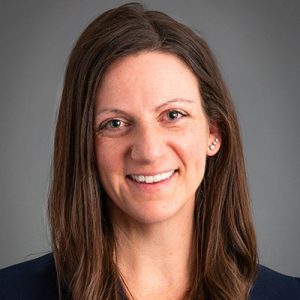
Hearing loss affects millions of people, and if left untreated it can result in social isolation, diminished ability to work, and increased anxiety and depression. Hearing evaluations are essential to diagnose and treat hearing loss, but unfortunately some hearing tests are not available in all languages, leaving many hearing healthcare providers without the tools needed to fully understand and treat non-English speaking patients. Division of Otolaryngology-Head and Neck Surgery Assistant Professor Sara Misurelli, PhD, AuD, and School of Nursing Assistant Professor Maichou Lor, PhD, RN, aim to change that with a new 18-month, $150,000 Dissemination and Implementation Research Pilot Award from the UW Institute for Clinical and Translational Research.
“Artificial intelligence technologies, especially those that support real-time translation, offer a way to overcome language barriers in audiology testing,” said Misurelli. “Our plan is to develop an AI-generated, automated system for a key hearing evaluation test, called the word recognition test, that will allow us to administer the test in a patient’s primary language and that will help an audiologist properly score the test results.”
Misurelli and Lor plan to develop an AI word recognition test scoring program for use in the Hmong community by using deep learning models that have been trained on extensive Hmong audio data. They will then pilot test the program by using Hmong patients’ verbal response to the words presented during the test, comparing the scores generated by the program to those generated by a bilingual Hmong team member. Once the AI program has been successfully adopted to accurately score the word recognition test and it has been demonstrated as feasible to incorporate into clinical settings, they plan to expand it to support other non-English languages.
“An AI solution for word recognition tests in the Hmong language will improve hearing healthcare and promote health equity for Hmong patients, a population that has been historically marginalized in the U.S. medical system” explained Lor. “In addition, our study will offer a roadmap for expanding this solution to other languages, which could ultimately benefit non-English speakers nationwide and allow audiologists to provide equitable healthcare in rural and underserved communities where resources for in-person interpreters may be nonexistent.”